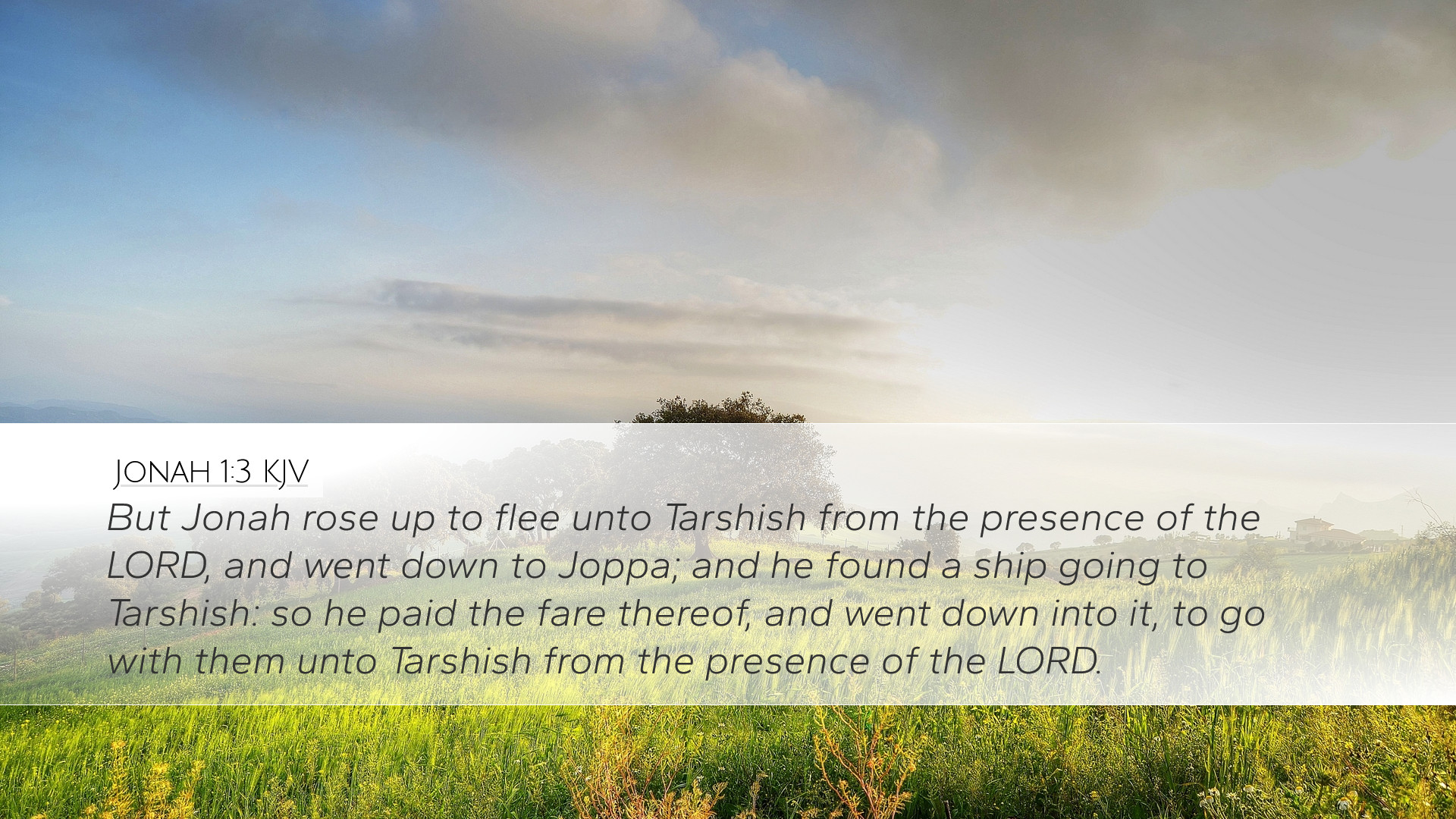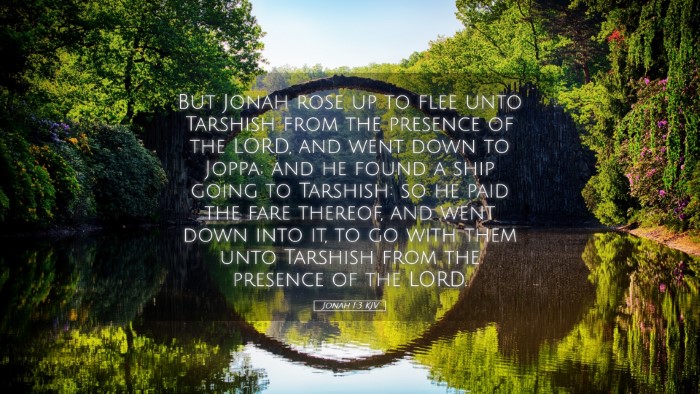Old Testament
Genesis Exodus Leviticus Numbers Deuteronomy Joshua Judges Ruth 1 Samuel 2 Samuel 1 Kings 2 Kings 1 Chronicles 2 Chronicles Ezra Nehemiah Esther Job Psalms Proverbs Ecclesiastes Song of Solomon Isaiah Jeremiah Lamentations Ezekiel Daniel Hosea Joel Amos Obadiah Jonah Micah Nahum Habakkuk Zephaniah Haggai Zechariah MalachiJonah 1:3
Jonah 1:3 KJV
But Jonah rose up to flee unto Tarshish from the presence of the LORD, and went down to Joppa; and he found a ship going to Tarshish: so he paid the fare thereof, and went down into it, to go with them unto Tarshish from the presence of the LORD.
Jonah 1:3 Bible Commentary
Commentary on Jonah 1:3
Verse: Jonah 1:3 - "But Jonah rose up to flee unto Tarshish from the presence of the Lord, and went down to Joppa; and he found a ship going to Tarshish: so he paid the fare thereof, and went down into it, to go with them unto Tarshish from the presence of the Lord."
Introduction
The Book of Jonah presents a fascinating narrative that speaks deeply about God's sovereignty, human disobedience, and the universal message of redemption. Jonah 1:3 specifically highlights Jonah's attempt to evade God's call, demonstrating the complexity of the human spirit in relation to divine expectations.
Analysis of the Verse
In this verse, Jonah's actions reveal a profound inner conflict that resonates with many believers. The phrase "rose up to flee" indicates not only a physical act but also a spiritual rebellion against God's directive.
Jonah's Decision to Flee
1. Disobedience and Fear: Matthew Henry examines Jonah's flight as a manifestation of his fear and hatred towards the Assyrian people, whom he is called to preach against. Instead of embodying compassion, Jonah's immediate reaction is to distance himself from the call of God.
2. The Journey to Tarshish: This journey represents an attempt to escape from divine accountability. As Adam Clarke notes, Tarshish is associated with distant, possibly maritime places, symbolizing not just a geographical retreat, but a spiritual one.
The Significance of Joppa
Joppa, the port city from which Jonah departs, serves as a critical geographical marker. It symbolizes Jonah’s unwillingness to engage with divine purpose, as noted by Albert Barnes. Joppa, being a significant trading port, indicates that Jonah is choosing a materialistic path rather than fulfilling his spiritual obligation.
Theological Implications
Jonah’s flight from the presence of the Lord illustrates a broader theological theme found throughout Scripture regarding the Lord’s omnipresence. As emphasized in various commentaries, particularly by Matthew Henry, it reveals the folly of attempting to escape God's presence. One cannot physically remove oneself from an omnipresent God, which points to the internal nature of spiritual disobedience.
God's Sovereignty
In fleeing, Jonah underestimates God's sovereignty. Adam Clarke highlights that despite Jonah’s attempts, God's will ultimately prevails. This sets the stage for the powerful narrative of God's pursuit of Jonah, which serves to remind theologians about God's relentless grace.
Practical Application for Believers
This passage serves as a mirror for many believers, reflecting their struggles with divine directives. In striving to align with God's will, one might feel the temptation to flee due to fear of the unknown or discomfort in sharing God's message, much like Jonah.
Addressing the Call
- Awareness: Acknowledge the personal calling and the potential fear associated with it.
- Response: Engage in prayer and meditation to discern how to respond faithfully.
- Community: Seek guidance and support from fellow believers who can encourage obedience and share in divine missions.
Conclusion
Jonah 1:3 exemplifies a critical moment of choice that resonates through generations, teaching us about the nature of disobedience, the struggle with divine calling, and God’s unwavering pursuit of His people. As emphasized by the likes of Barnes and Clarke, Jonah’s narrative extends beyond a simple prophetic story; it beckons all believers to consider their own responses to God’s directives.


